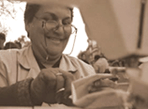
Interview with Celia Martinez of a Worker-Controlled Factory in Argentina
One day before Argentina's economic crash on December 19, 2001, fifty-two workers from the Brukman Textile Factory, the majority of them women, refused to continue working until their bosses handed over their back-wages. Plagued by debt and gradual bankruptcy, the owners hadn't paid the workers their weekly pay check for fifteen days. The bosses demanded that the workers returned to their stations, but the sewing machines remained silent.




